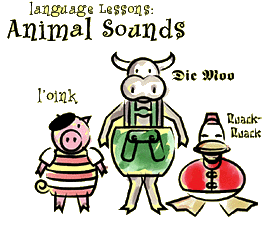 |
 |
 |
|
|||
|
Animal Sounds
When I checked into a hostel in France not long ago, I asked the reception clerk if he had an extra alarm clock I could borrow...only I couldn't remember the French word for "alarm clock." This kind of thing starts that awkward travel experience when your pantomime, Pictionary, or acting skills come into play. For lack of a better idea, I said, "cock-a-doodle-doo," and then pointed to a clock on the wall. This produced a spectacular expression of confusion on the clerk's face, which turned to worry, and for a moment I thought he was going to call the local psychiatric clinic and have them pick me up. Then it occurred to him, possibly because of my arm flapping, that I was, indeed, imitating a rooster. "Ahhh," he finally said, speaking in French, "A rooster...the sound is like this: "co-co-ree-co." "Yes!" I said, feeling like I was finally making some progress, "a rooster!" "Sorry," he told me, "we don't have roosters here." After working on my French, I began to wonder how the sound of a rooster is expressed in other countries, and, for that matter, how some other animals might sound. So I went to the International School in Paris, a private primary school with children from 40 different nations and spoke with an entire class of nine- and 10-year olds, figuring the real experts haven't quite hit puberty yet. Naturally, it turned out there's not just the French "co-co-ree-co." There's the Spanish version, which Virginia from Madrid says is: "ca-ca-ra-ca." Minwoo from Korea tells me its "kookeow." Melinda has this Zimbabwean version: "coocoorecoocoo." Kate from Australia led me to believe that roosters are also blessed with an Australian accent: "cock-a-doodle-doo." In America frogs use the rather abstract "gribbit-gribbit." In Spain, however, a frog goes: "crok-crok." In Malaysia, Amir tells me, a frog goes: "grog-grog," while in Korea, Minwoo assures me, it's "gegoll-gegell." And young Katoro from Japan said it's "gero-gero-gero." How about in place of a pig's "oink-oink"? The Japanese expression is "bukee-bukee". In Korean it's "kul-kul." We might say "neigh," but we don't have a very descriptive sound for a horse in English. Fortunately, other countries do. In Korea, according to Minwoo, it's "ee-he-he-hing."
In Japan, it's "hee-heeing." Ferris from Kuwait wasn't sure, but offered a horse impression. I also thought the students might have some sounds for animals that we don't know very well, so I asked. Kotoro says the Japanese cicada insect goes: "meen-meen-meen." And Minwoo says a Korean mouse goes: "chick-chick." Kate from Australia has an imitation of a Kookaburra bird noise. Amir, from Malaysia, said an Orangutan goes like this. And Robert from Bolivia said a sloth "doesn't make any sound." From the International School in Paris, this is Doug Lansky for The Savvy Traveler. |
|
For other animals in different languages, try going to the web site
Sounds of the World's Animals:
Listen to what some of them really sound like at
Digital Nirvana's Animal Sounds Resources: |
 | American Public Media Home | Search | How to Listen ©2004 American Public Media | Terms of Use | Privacy Policy |
